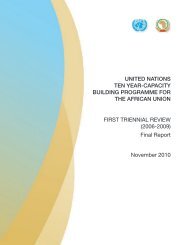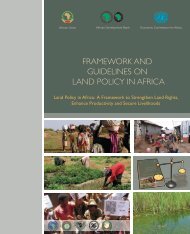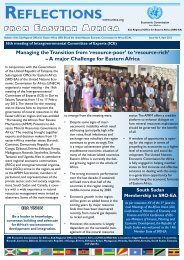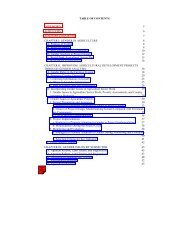A Decade of NEPAD - Economic Commission for Africa - uneca
A Decade of NEPAD - Economic Commission for Africa - uneca
A Decade of NEPAD - Economic Commission for Africa - uneca
Create successful ePaper yourself
Turn your PDF publications into a flip-book with our unique Google optimized e-Paper software.
12 A <strong>Decade</strong> <strong>of</strong> <strong>NEPAD</strong>: Deepening <strong>Africa</strong>n Private Sector and Civil Society Ownership and Partnership<br />
Accelerating the Integration Process – The Willoughby Era (January 2008 – March 2009)<br />
In January 2008, Ambassador Olukarade Willoughby, who<br />
had been serving as a Deputy to Pr<strong>of</strong>. Mucavele became the<br />
third leader <strong>of</strong> the <strong>NEPAD</strong> Secretariat, albeit serving with<br />
the title <strong>of</strong> “Interim CEO” . Under Ambassador Willougby’s<br />
watch, the AU integration process began to develop clarity<br />
and significant ef<strong>for</strong>ts were undertaken to engage with the<br />
AU’s operational leadership toward the establishment <strong>of</strong><br />
a new integrated <strong>NEPAD</strong> structure.<br />
The change <strong>of</strong> guard within the <strong>Africa</strong>n Union through<br />
which H.E. Dr. Jean Ping became the Chairperson <strong>of</strong> the<br />
AUC in February 2008 also served to accelerate ef<strong>for</strong>ts to<br />
integrate <strong>NEPAD</strong> into the Union as Dr. Ping advocated<br />
strongly and consistently about the need <strong>for</strong> greater cohesion<br />
between the <strong>NEPAD</strong> Secretariat and the <strong>Africa</strong>n<br />
Union <strong>Commission</strong> in Addis Ababa.<br />
Under Ambassador Willoughby, the mandate passed in Algiers<br />
in March <strong>of</strong> 2007 to integrate <strong>NEPAD</strong> and to establish<br />
the <strong>NEPAD</strong> Planning and Coordinating Agency, picked up<br />
significant steam. In 2008, an external consultancy exercise<br />
was authorized to in<strong>for</strong>m the integration process and set<br />
<strong>for</strong>th recommendations <strong>for</strong> the way <strong>for</strong>ward.<br />
In April 2008, in Tokyo, Japan at the 10 th meeting <strong>of</strong> the<br />
<strong>Africa</strong> Partnership Forum (APF) delegates pointed out<br />
that the progress <strong>of</strong> implementation <strong>of</strong> the <strong>NEPAD</strong> Action<br />
Plan between 2005 and 2008 had been negligible and<br />
only a small number <strong>of</strong> <strong>NEPAD</strong> projects, particularly<br />
infrastructure projects, had been implemented.<br />
Toward, accelerated implementation, the APF’s members<br />
recommended that there be a revision <strong>of</strong> the US$115 billion<br />
<strong>NEPAD</strong> Action Plan to demonstrate greater alignment<br />
between the nine <strong>NEPAD</strong> objectives and the Millennium<br />
Development Goals. Furthermore, it was suggested that<br />
greater ef<strong>for</strong>t be made to clarify the state <strong>of</strong> investment<br />
readiness <strong>of</strong> the priority initiatives, and to more closely estimate<br />
the resources required to implement the revised plan.<br />
Internally, while there was on-going trans<strong>for</strong>mation and<br />
realignment within the AU and <strong>NEPAD</strong>, externally, support<br />
<strong>for</strong> <strong>NEPAD</strong> continued to grow, albeit most <strong>of</strong>ten<br />
below the radar <strong>of</strong> popular media. An example <strong>of</strong> this<br />
was the expanded work being undertaken by the United<br />
Nations Regional Coordination Mechanism which recorded<br />
greater programme harmonization and coordination<br />
among its clusters, and an increase in jointly implemented<br />
programmes 6 .<br />
<strong>NEPAD</strong> outreach ef<strong>for</strong>ts to civil society and private sector<br />
stakeholders during this era were predominantly implemented<br />
on an adhoc basis, although there were on-going<br />
<strong>NEPAD</strong> initiatives to engage civil society in the APRM<br />
process and with gender focused initiatives.<br />
While there were fewer opportunities <strong>for</strong> the <strong>Africa</strong>n<br />
private sector to engage with <strong>NEPAD</strong>, the <strong>Africa</strong>n Development<br />
Bank and private sector advocacy organs such as<br />
the <strong>NEPAD</strong> Business Group (chaired by the <strong>Africa</strong>n Business<br />
Roundtable) and the <strong>NEPAD</strong> Business Foundation<br />
continued to lobby <strong>for</strong> increased inclusion in the <strong>NEPAD</strong><br />
planning process, generally, and <strong>for</strong> increased opportunities<br />
<strong>for</strong> participation in <strong>NEPAD</strong> projects, specifically.<br />
During 2008, as the AU-<strong>NEPAD</strong> integration process continued,<br />
the search also intensified <strong>for</strong> a permanent head<br />
<strong>of</strong> the <strong>NEPAD</strong> Secretariat.<br />
6 RCM <strong>Africa</strong> 2009, Delivering as One <strong>for</strong> <strong>Africa</strong>, p. 8 – Established to<br />
serve as the mechanism <strong>for</strong> coordinated support to <strong>NEPAD</strong>, the RCM<br />
drew its mandate from the UN General Assembly resolution 57/7 <strong>of</strong><br />
November 2002 to have all UN organizations, within their respective<br />
mandates, to align their activities in <strong>Africa</strong> with the priorities <strong>of</strong> the New<br />
Partnership and “to organize the activities <strong>of</strong> the United Nations system<br />
around clusters covering the priority areas <strong>of</strong> the New Partnership”.<br />
Integration Completion and Re-launch – The Mayaki Era (April 2009 – Present)<br />
At the 20 th Summit <strong>of</strong> the <strong>NEPAD</strong> Heads <strong>of</strong> State and<br />
Government Implementation Committee (HSGIC) on<br />
January 31, 2009 in Addis, Ababa, AUC Chairman Dr.<br />
Jean Ping announced <strong>for</strong> consideration the appointment<br />
<strong>of</strong> Dr. Ibrahim Assane Mayaki, a <strong>for</strong>mer Minister and<br />
Prime Minister <strong>of</strong> Niger, as the new CEO <strong>of</strong> <strong>NEPAD</strong>. The<br />
appointment was endorsed by the <strong>NEPAD</strong> Implementation<br />
Committee and subsequently confirmed at the February<br />
2, 2009 meeting <strong>of</strong> the AU Assembly.<br />
In April 2009, when Dr. Ibrahim Mayaki <strong>for</strong>mally became<br />
the head <strong>of</strong> <strong>NEPAD</strong> a new era <strong>of</strong> engagement began as







